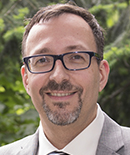- Emotional Distress and PTSD in the Perioperative Period: Proactive Management and Prevention (PN307)
- 11 a.m.-Noon Monday
- BCEC Room 107ABC
Recurrent exposure to violence and life-threatening situations can link physicians with soldiers, firefighters and police officers in the form of post-traumatic stress disorder (PTSD). It also can link physicians with patients who have experienced traumatic illness or injury.
Not all people exposed to trauma develop PTSD, and the incidence can be reduced in someone who has been exposed to a stressor. This Critical Care track session will look at risk factors for the condition and how it can be prevented in physicians and their patients.

Matthias J. Merkel, M.D., Ph.D.
“As clinicians, we feel shielded from most diseases. We never assume we will become the patient. But it has become clear that we can be at risk for PTSD and that critical care can cause PTSD,” said session moderator Matthias J. Merkel, M.D., Ph.D.
“Why do physicians not all get it? We don’t get it because the things we know will reduce your risk from getting PTSD are in place. We are in an intact social work environment, we have a social network structure, we can process stress situations effectively and it is easier to seek help. But that does not work 100 percent of the time,” said Dr. Merkel, Chief Medical Capacity Officer and Director of Adult Critical Care at Oregon Health & Science University.
Dr. Merkel and Marek Brzezinski, M.D., Ph.D., a professor at the University of California, San Francisco School of Medicine, will explain how PTSD originates in the brain. They also will explore a combination of pharmacologic and nonpharmacologic interventions.
Dr. Brzezinski will use case vignettes to explain his PTSD research at the Veterans Health Administration and prevention strategies that were developed for patients.
“Patients with PTSD avoid health care, especially if it is triggered out of health care,” Dr. Merkel said. “They do not want to relive it. Avoidance is one of the biggest strategies.
“Some patients cannot tolerate re-exposure to what caused the trigger or anything related to that. Dr. Brzezinski will show some specific cases of how you can overcome that. He will discuss how to help that patient not leave the health care facility because he or she cannot stand it anymore.”
The speakers also will explore research about PTSD triggers, possible origins in the brain and genetic differences that make some people susceptible to PTSD. They will explain how the ABCDEF bundle approach to critical care developed by the Society of Critical Care Medicine can help reduce the risk of PTSD.
“That reduces the likelihood of developing PTSD after critical illness for our patients. It is all about patient and family empowerment, patient engagement, keeping them updated, getting them out of bed earlier and using fewer medications,” Dr. Merkel said. “Those are all factors that have been shown to reduce PTSD development.”
Return to Archive Index